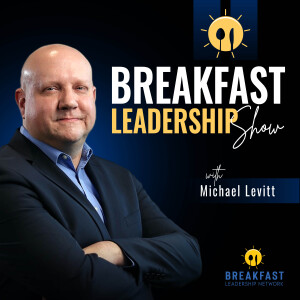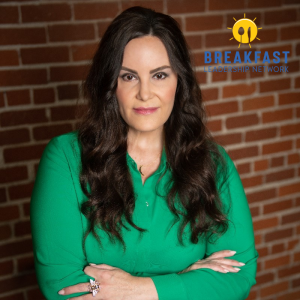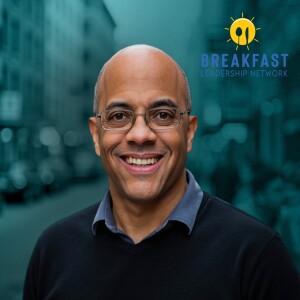Breakfast Leadership Show
The Breakfast Leadership Show is a top 20 global podcast hosted by Michael D. Levitt.
It features thought-provoking discussions with industry leaders, experts, and influencers, focusing on leadership, burnout prevention, workplace culture, and personal growth. The show provides listeners with actionable insights on improving productivity, fostering resilience, and enhancing well-being in both professional and personal life.
Want to be a guest on the Breakfast Leadership Show?
Visit https://BreakfastLeadership.com/PodcastGuest
The Breakfast Leadership Show may include sponsored guest appearances, which means the guests may have provided financial compensation to participate in the podcast.
Episodes

Friday May 23, 2025
Friday May 23, 2025
Transforming How We Work: Rethinking Operating Models with Jen from Talk Point Advisory Group
In this thought-provoking conversation, I sat down with Jen from Talk Point Advisory Group, a boutique consulting firm that helps organizations reimagine and revitalize how they operate. We dove deep into the often-overlooked world of operating models — the blueprint behind how work gets done — and why companies need to stop letting these frameworks evolve by default.
Rethinking How Work Gets Done
Jen and I explored how an organization’s operating model influences everything from decision-making to resource allocation. She shared powerful insights about making these models more intentional, especially when “invisible rules” — embodied by figures like the mythical “Beth” who holds power without a title — shape how teams function. I emphasized that when organizations fail to design and adapt their operating models, they often become the next cautionary tale — a statistic in the high failure rate of businesses unable to pivot in a changing market.
Legacy Systems vs. the Digital Future
Too often, companies bring in top talent with high hopes but then box them into outdated systems. Jen and I discussed how legacy organizations must shift from rigid, project-based structures to nimble, product-focused approaches. This isn’t just about upgrading systems — it’s about transforming culture, developing new skill sets, and staying laser-focused on customer experience. Because in this fast-moving digital age, survival depends on relevance.
Breaking Down Silos: A Lesson from 3M
We’ve all seen the damage siloed thinking can do. I shared how industrial-age approaches, like those once used by GM, keep innovation locked behind walls. Jen illustrated how companies like 3M broke free — giving employees space to experiment, leading to inventions like the Post-it Note. This isn’t just a story about sticky paper; it’s a testament to the power of cross-functional freedom and creative autonomy.
Collaboration That Fuels Innovation
Jen highlighted the power of horizontal collaboration in successful product teams. Drawing inspiration from NASA’s Apollo 13 mission and our everyday digital tools, she emphasized how solutions to complex problems emerge when different disciplines truly work together — not in silos, but side-by-side.
The Overlooked Power of Marketing
In one of my favorite moments, I admitted I wish I had focused more on marketing in college — it’s that essential. Jen and I talked about why marketing isn’t just a department, it’s a growth engine. When accounting and marketing speak the same language, businesses gain the insight to fuel smart investments and sustainable expansion — especially during challenging times like inflation or global uncertainty.
Culture Drives Everything
Culture isn’t just a buzzword — it’s the soul of your organization. I reflected on transforming a healthcare organization by simply listening and responding to what our people needed. Jen and I agreed: when organizations clarify decision-making and empower their teams, magic happens. Engagement rises, turnover drops, and performance soars.
Fixing the Customer Experience (for Real)
Improving customer experience isn’t a quick fix — it requires rooting out the hidden obstacles: tech inefficiencies, outdated processes, and — you guessed it — silos. Jen walked us through how her team helps organizations simplify, streamline, and finally push past the 75% “stuck” point where so many give up. We wrapped up by underscoring the need for persistent effort and aligned support, and I encouraged our listeners to connect with Jen and the team at Talk Point Advisory Group for guidance.
Ready to Rethink Your Operating Model?
If you’re ready to stop leaving your organization’s performance to chance, this episode is a must-listen. Connect with Jen and the Talk Point team to start the conversation and unlock the full potential of your organization.
Website: https://www.tuckpoint.com/
LinkedIn: https://www.linkedin.com/in/jgswanson/

Thursday May 22, 2025
Business GPS: Tim Dwyer on Strategy, Culture & Emotional Intelligence
Thursday May 22, 2025
Thursday May 22, 2025
Charting Your Course: A Business Navigation System That Aligns Strategy, Intuition & Purpose
In this episode, we dive deep with Tim Dwyer, a visionary who has spent over three decades developing a true "Google Maps for business"—a navigation system that integrates logical strategy, heart-centered leadership, and deep intuition. Tim’s entrepreneurial spark ignited at age 12 during a petrol strike in Australia, selling coffee to stranded drivers. That ingenuity evolved into a career dedicated to helping leaders and organizations find their true north in complex business environments.
Emotional Intelligence: The Leadership Edge We Can't Ignore
Tim and I explore how tapping into our emotional intelligence is not just a personal growth strategy—it's essential for leadership effectiveness. When decisions flow from inner alignment, clarity and momentum follow. When there’s chaos? That’s your signpost that something’s off. Tim shares his emotional mapping system, while I add insight on how untrained managers often default to poor leadership patterns due to lack of emotional grounding and practical guidance.
Emotional Ownership: The Cornerstone of Healthy Work Cultures
We take an honest look at the drama that unfolds when leaders deflect emotional responsibility. Tim breaks down how full ownership of our emotional responses dismantles blame and invites maturity into the workplace. I couldn’t agree more—teams thrive when leaders stop pointing fingers and start showing up with accountability and self-awareness.
Foresight in Leadership: Seeing the Iceberg Before You Hit It
I share a recent conversation with an organization considering a bold move they may not be ready for—an all-too-common scenario. Using an oceanic analogy, I explain why leaders must develop foresight to navigate risk and avoid future burnout. It’s not about playing it safe—it’s about making sure your ship is seaworthy before you launch into deeper waters.
Capability Development: Growing Beyond Your Comfort Zone
Tim outlines the predictable stages of business growth and the leadership capacity needed at each level. Whether you're leading a team of 10 or scaling to 1,000, the same principles apply: sharpen your skills, solidify your culture, and develop internal navigational systems that support sustainable growth. And yes, this applies whether your team is made up of employees, freelancers, or AI tools—culture and capability remain your anchors.
Curiosity, Reflection & Purpose: A Blueprint for Leadership Renewal
We talk about the often-overlooked power of self-reflection. I encourage listeners—whether you're on the front lines or in the C-suite—to step back, get curious, and revisit past experiences with grace, not judgment. The goal? To realign with your purpose and reignite your leadership impact. Distraction is the disease—curiosity is the cure.
Authentic Culture: More Than Ping-Pong Tables and Mission Statements
Tim shares a powerful case study of a software company that had great perks but lacked true cultural alignment. Once the leadership reconnected with their original vision and re-established meaningful cultural agreements, collaboration and energy returned. The result? A culture that magnetized both top talent and ideal customers. As I often say—culture isn’t what you write on the wall, it’s how your people feel every day they walk through the door.
Tim’s Upcoming Book: A Must-Read for Every Leader Navigating Change
We wrap with a preview of Tim’s upcoming book, launching August 2025. Packed with stories, case studies, and actionable strategies, this book is designed for businesses of every size—from startups to scaling giants. You can pre-order your copy now at tolemy.com. If you’re serious about leading with clarity and growing without losing your soul, this one’s for you.

Tuesday May 20, 2025
Tuesday May 20, 2025
Unlocking Spiritual Intelligence, Calm Leadership, and AI Resilience in the Workplace
In this compelling episode, I sit down with Amy to explore three powerful themes that are reshaping today’s workplaces: spiritual intelligence, leading through chaos, and navigating the rise of AI with confidence and compassion.
Part 1: Spiritual Intelligence in the WorkplaceAmy shares her transformational journey—from corporate executive to purpose-driven leader—sparked by a personal spiritual awakening. We dive into how spiritual intelligence can create workplaces that foster well-being, alignment, and sustainable productivity. This isn’t about religion—it’s about intentional awareness, empathy, and a values-driven culture that fuels human performance.
Part 2: Navigating Chaos With Calm and InnovationTogether, we examine how calm leadership can be a competitive advantage in uncertain times. Amy introduces the concept of “Edgewalkers”—individuals who thrive on the edge of chaos and help others find clarity amid the noise. I reflect on my own leadership experiences, including how postmortem meetings helped my teams learn from failure and bounce back stronger. Innovation, we agree, often emerges in the messiest moments—if leaders are equipped to lead with presence and poise.
Part 3: Addressing AI and Automation FearsWith automation accelerating, fear is rising among employees. Amy and I tackle the emotional side of digital transformation, emphasizing the need for leaders to recognize change archetypes within their teams. We discuss how trust, transparency, and emotional intelligence can ease transitions and unlock the creative potential of AI. The future of work isn’t just about tech—it’s about trust, connection, and leading from within.
🎙️ Tune in if you’re a leader, changemaker, or future-focused professional ready to lead with clarity, calm, and compassion.
As the founder of the executive coaching firm Create Magic At Work®, Amy Lynn Durham is a seasoned business leader and executive coach with a bold vision: transforming workplaces into vibrant centers of creativity, productivity, and fulfillment. Drawing upon her extensive experience as a former corporate executive in the telecommunications industry, Amy emphasizes the need for holistic approaches to organizational development and leadership enhancement.
The executive coaches at Create Magic At Work® envision workplaces where magic is not just a mystical concept but a tangible reality, brought to life through intentional leadership, innovative strategies, and a culture of collaboration. As the driving force behind Create Magic At Work®,
Amy hosts the globally renowned Create Magic At Work podcast and authorizes a book by the same name. The team at Create Magic At Work® aims to inspire and help foster workplaces that thrive as environments where magic is not just a mystical concept but a tangible reality.
Connection Links:
Book: https://amzn.to/4bg4oUU
Website: https://createmagicatwork.net
LinkedIn: https://www.linkedin.com/in/amylynndurham/
LinkedIn Business: https://www.linkedin.com/company/create-magic-at-work/
Instagram: https://www.instagram.com/createmagicatwork
X: https://x.com/durham_amy

Monday May 19, 2025
Monday May 19, 2025
Meditation Transitions in Workplace Wellness
In this episode, Jillian and Michael share their journeys from corporate careers to prioritizing meditation and workplace wellness. Jillian, a former publishing company owner, discovered the power of meditation in preventing burnout and made it her mission to teach others. Michael, a healthcare leader turned workplace culture strategist, shifted his focus to addressing burnout at its root. They explore how meditation has become a vital tool for maintaining work-life balance, especially in today’s demanding professional landscape.
Youth Stress and Chronic Illness
Michael and Jillian dive into the rising stress levels among Millennials and Gen Z, discussing how anxiety and chronic stress are manifesting in younger generations. Michael raises concerns about premature aging trends, while Jillian highlights how a “tired but wired” nervous system can lead to panic, paralysis, and long-term health consequences. They emphasize the need for internal solutions—like meditation and self-reflection—over quick external fixes. Jillian also notes the growing prevalence of chronic illnesses among young people, a trend that could impact overall life expectancy.
Openness to Change and Personal Growth
Change is inevitable, but embracing it is a choice. Jillian discusses the importance of recognizing when we’re ready for transformation, while Michael highlights self-reflection as a key driver of personal growth. He stresses that we have more control over our circumstances than we often believe. Together, they reinforce the idea that prioritizing personal well-being isn’t selfish—it positively impacts everyone around us. Growth and change, they agree, are essential for both individual fulfillment and societal progress.
Meditation as a Daily Reset Tool
Jillian introduces her book Do Reset, which redefines meditation as a practical daily reset rather than a complex practice. She dispels the myth that meditation is about silencing thoughts, explaining instead how it trains the mind for better resilience, focus, and decision-making. Michael shares his own experiences with meditation, underscoring the importance of embracing thoughts rather than resisting them. They agree that small, consistent resets throughout the day can create a profound impact on overall well-being.
Jillian’s Meditation Center Work
Michael and Jillian also discuss Jillian’s work at the London and New York Meditation Centers. For those interested in learning more, Jillian encourages listeners to visit the centers’ websites.
Websites:
https://www.londonmeditationcentre.com/
https://newyorkmeditationcenter.com/learn-to-meditate/
Book: (Available April 2025)
https://amzn.to/4hZTGEH

Friday May 16, 2025
Transforming Trauma: Amrita Subramanian on Growth After Crisis
Friday May 16, 2025
Friday May 16, 2025
Living Through the Aftershock: COVID-19’s Lasting Impact on Our Lives and Leadership
In this deep and wide-ranging conversation, Amrita Subramanian and Michael D. Levitt explore the profound and lingering effects of the COVID-19 pandemic—not just on health systems, but on our humanity, leadership, and everyday decisions.
Reckoning With Collective TraumaThe episode opens with a candid reflection on how society continues to carry the emotional residue of the pandemic. Amrita underscores the importance of acknowledging that crisis is not an interruption—it’s a constant. Michael builds on this by noting how many individuals still carry unprocessed trauma, often triggered by subtle reminders from the pandemic era. Leaders, he argues, must create space for that healing, not push people to simply “move on.”
Mortality, Reflection, and Missed OpportunitiesAmrita shares that COVID-19 accelerated deeper societal trends and forced a confrontation with mortality. Michael adds that the pandemic was a moment when the world could have come together—yet instead, we saw fragmentation. Together, they challenge listeners to reflect on whether we’re growing from the crisis—or avoiding it.
Growth Through AdversityBoth hosts explore how some individuals used the pandemic as a springboard for transformation. Amrita calls these people "magnets"—those who attract possibility through growth and reflection. Michael discusses how our choices ripple outward, affecting teams, families, and communities, and urges leaders to lean into thoughtful, values-based decision-making.
Making Peace With ChaosIn a thought-provoking segment, Amrita reframes chaos—not as disorder, but as the natural state when clarity and consensus are missing. Michael and Amrita discuss the necessity of continuous learning and the paradox of a generation navigating both truth and noise. The takeaway? We’re standing at a crossroads that could lead to either a new renaissance—or a descent into disconnection.
Humility and Leadership in Uncertain TimesAmrita calls for a return to humility, especially in leadership. She advocates for an unlearning of rigid systems and encourages empathy-based decision-making. Michael echoes this, pointing to the dangers of ego in crisis and the importance of making choices grounded in service and self-awareness.
Decisions That Shape the FutureMichael shares strategies for making clear-headed decisions amid chaos—removing emotion from the process and using systems like checklists to stay aligned. Amrita offers a counterbalance: the role of curiosity and inner wisdom in guiding leaders toward choices that benefit the greater good. Together, they highlight the legacy we’re leaving for the next generation—a chance to lead with civility, courage, and care.
Living Fully, Leading WiselyThe episode closes with reflections on what it means to live a fulfilling life. Amrita encourages gentle self-examination, while Michael reminds us that leadership starts with personal responsibility—and a commitment to making choices that serve not just ourselves, but those around us.
Amrita is a former Fortune 500 VP who has devoted 22+ years of her career to helping organizations thrive amid crises.
She is also a trailblazer in post-disruptive growth as a faculty member at the University of Pennsylvania and a guest lecturer at Wharton. She has almost completed her Ph.D. on post-traumatic growth in adults through COVID-19.
As the world faced the first collective trauma/crisis disruption in modern-day history, the COVID pandemic, Amrita launched a first-of-its-kind study to explore how pain leads to growth and analyze our ability to heal ourselves during an unparalleled crisis.
Her work is dedicated to providing education and practical solutions for individuals and communities worldwide. Her lessons draw from the evidence-based practices of everyday people who have shown heartfelt humility and wisdom in the face of crisis and devastation.
The research study has amassed global participation, and she is convinced that it will show the pandemic strengthened us and renewed our sense of identity, purpose, and community.
Amrita knows well that there is growth from trauma based on what she's endured in her own life.
At the age of five, she was abandoned in a convent. The trauma and abuse she endured throughout that time resulted in selective mutism until she was 11 years old, among other things.
Amrita is now using her voice to help guide humanity and speak out about the many facets of pain and what good could come from them.
On the podcast, she would love to talk about:
What happens to the future and nature of work (employees, employers, departments, engagement, stress, fatigue, etc.) following the collective trauma we all walked through?
What is the nature of post-disruptive/post-crisis leadership? Who do we need to be to lead ourselves to the next edge of growth and harmony, given crises are only now going to be constant (economic or ecological)?
The pandemic is still largely under-processed, and folks do not seem to be making denial a choice. People seem to be hungry to process what they experienced. This article explains why we need to talk about and process pain and how pain can also lead to growth.
To get a sense of Amrita, here's an episode she did recently on The Trauma Therapist Podcast, where she talked about how her life has been shaped by continuous growth from trauma.

Thursday May 15, 2025
Thursday May 15, 2025
Disrupting Status Quo for Business Growth
Michael and Lisa discussed the importance of disrupting the status quo for business growth. Lisa emphasized the need for leaders to challenge their current processes and embrace innovation to overcome plateaus and achieve growth. They agreed that the combination of people, process, and technology is crucial for business success.
Technology Should Enhance Human Capabilities
Michael and Lisa discussed the importance of understanding employees and processes before implementing technology. They emphasized that technology should be used to enhance human capabilities, not replace them. Lisa introduced the concept of "super fast, bad" to describe the potential negative outcomes of technology implementation without proper understanding. Michael highlighted the need for organizations to adapt to the changing workforce and acknowledged the challenges faced by leaders in creating a culture that works for everyone. They also touched on the issue of disengaged employees and the need for organizations to adapt to the changing workforce.
Innovation Process for Business Growth
Lisa emphasized the importance of innovation in businesses to adapt to the rapidly changing world. She proposed building an innovation process to leverage employees, customers, and clients' ideas, and to create a constant flow of new ideas to drive growth. Michael agreed, highlighting the need for internal marketing and creating a safe environment for employees to share ideas. He used the example of 3M and the Post-it notes to illustrate how an idea can lead to significant innovation and success.
Fostering Creativity and Self-Reliant Leaders
Lisa and Michael discussed the importance of creating an environment where people can be creative and innovative, rather than being constrained by job descriptions and measurements. They emphasized the need for leaders to step back and let their team members do their jobs, as this fosters growth and development. They also highlighted the significance of succession planning and decentralizing decision-making to grow self-reliant leaders. The conversation concluded with the importance of hiring people who are better than oneself, as this benefits both the individual and the organization.
Lisa Offers Self-Reliant Leadership Program
Lisa offered her self-reliant leadership program to Michael's audience, including an innovation engine blueprint and an innovation clarity call. She encouraged leaders to reach out to her via LinkedIn for more information. Michael appreciated the offer and encouraged his audience to take advantage of it, emphasizing the importance of continuous growth and improvement.
------
🎙️ Breakfast Leadership Show | Guest: Lisa L. LevyEpisode Title: "How to Build a Business That Runs Without You—And Grows Without the Chaos"Host: Michael D. Levitt | Burnout & Workplace Culture Expert
🔗 Subscribe: YouTube | Podcast📣 Book Michael to Speak: BreakfastLeadership.com/Speaking
EPISODE OVERVIEW:
What if your business could scale without you having to white-knuckle the wheel every day?
In this powerful conversation, I sit down with Lisa L. Levy, the brilliant disruptor behind Lcubed Consulting and author of the #1 best-seller Future Proofing Cubed. Lisa has helped thousands of founders stop putting out fires and start building businesses that can run—and grow—without them.
If you’re a founder or executive tired of being the bottleneck in your own business, this is your wake-up call.
Lisa breaks down her proprietary Adaptive Transformation™ Framework, which boosts productivity by 40% while reducing operational bottlenecks by 65%. It’s not theory—it’s a proven method for empowering leadership teams to take the reins, so you can actually lead… not manage chaos.
🔥 WHAT YOU’LL LEARN IN THIS EPISODE:
How to break your business (strategically) to build a more resilient one
The “Freedom Framework” that enables $15M+ founders to step back without losing control
Why “That’s how we’ve always done it” is a dangerous phrase for scaling companies
How to align people, process, and tech to weather any storm
Real strategies to turn reactive teams into self-reliant leaders who think like owners
ABOUT LISA L. LEVY:
Lisa is the Founder & CEO of Lcubed Consulting and host of the Disrupt and Innovate podcast. Known for her no-nonsense approach to operational transformation, she helps visionary founders shift from stuck to scaling through clarity, enablement, and performance.
She's an award-winning leader, a transformational guide, and a true advocate for empowering businesses to run without the founder on speed dial.
Follow Lisa and mention "Innovation" and you hear Lisa on the Breakfast Leadership Show!📱 @lisallevy | @lcubedconsulting🌐 Website
RESOURCES MENTIONED:📘 Future Proofing Cubed – Get the book: Amazon🎧 Disrupt and Innovate podcast – Listen Now
LET’S CONNECT:🔗 LinkedIn: MichaelDLevitt🐦 X (Twitter): @bfastleadership📸 Instagram: @bfastleadership🎙️ More Interviews: BreakfastLeadership.com/media📚 Books: Browse all
If you enjoyed this episode, share it with a fellow leader who's ready to get out of the weeds and into true leadership.
📩 Subscribe, rate, and leave a review!
#LeadershipTransformation #BusinessWithoutBurnout #AdaptiveLeadership #FounderFreedom #BreakfastLeadershipShow #LisaLLevy #SelfReliantTeams #BusinessScalability #OperationalExcellence

Wednesday May 14, 2025
Wednesday May 14, 2025
Seeing the Unseen: Kevin’s Journey Through Business, Blind Spots, and Redemption
In this deeply introspective episode of the Breakfast Leadership Show, I sat down with Kevin, a business owner and consultant whose journey is as cautionary as it is inspiring.
Kevin pulls back the curtain on his early days—driven, ambitious, but unaware of the blind spots that would later cost him everything. From selling a business during the height of the .com boom to entering a consulting deal that spiraled into a federal fraud case, Kevin's story is a sobering reminder of how even well-intentioned professionals can find themselves in unthinkable circumstances. His experience led to 33 months in federal prison for a crime he didn’t knowingly commit.
But Kevin's story doesn’t end in incarceration—it begins there. What followed was a profound period of personal growth. Kevin speaks candidly about the thinking errors and unconscious biases that clouded his judgment and how this hard-earned clarity sparked a lifelong commitment to self-awareness and helping others see what they might be missing.
Together, we explored the dangers of overlooked blind spots in leadership—how they lead to disengagement, poor communication, and costly turnover. We talked about the Gallup report highlighting the steep drop in employee engagement and what organizations must do to reverse that trend. Hint: it starts with middle management and a real investment in people—not just performance.
Kevin also introduced his Blind Spot Assessment, a powerful tool used by organizations including the American Board of Radiology to identify and address cognitive gaps in leaders. Whether for candidate screening or leadership development, it’s becoming a game-changer in building healthier workplace cultures.
This episode is a masterclass in leadership accountability, personal transformation, and the human capacity to rise from failure. Kevin’s bestselling book, Blind Spots: Why Good People Make Bad Choices, dives even deeper into his story—and it’s well worth the read.
If you’ve ever wondered how a leader can go from success to setback and back again—this one’s for you.
Website: https://BlindSpots.com
Book: https://amzn.to/3YMsJfQ

Monday May 12, 2025
Monday May 12, 2025
From the Streets to Significance: Ken’s Incredible Journey of Redemption
In this powerful episode, I sit down with Ken—a remarkable individual whose life journey redefines perseverance, transformation, and the human spirit. Born into hardship as the son of a teenage runaway and a pimp in New York City, Ken’s early years were marked by instability, foster care, and adoption. Despite earning his way to Dartmouth and achieving academic success, he faced a decades-long battle with addiction, homelessness, and multiple felony convictions.
But Ken’s story doesn’t end in darkness. In September 2024, he proudly celebrated 20 years of sobriety. Now a thriving business owner, Ken channels his energy into uplifting others and paying it forward.
The Turning Point: Choosing Growth Over a Life Sentence
Ken opens up about his time in prison, sharing a raw and honest perspective on the prison system, recovery, and the choices that can change everything. He identifies three common paths among inmates and the pivotal mindset shift that ultimately saved his life. During his third incarceration, Ken committed to rebuilding every part of himself—mentally, emotionally, physically, and spiritually. That commitment led him to a halfway house, a dedicated sponsor, and the intentional decision to reconnect with society in a meaningful way.
"Becoming Ken": A Story of Hope, Healing, and Humanity
Ken’s book, Becoming Ken, is more than a memoir—it’s a blueprint for transformation. We dive into the book’s core themes: understanding personal motivation, embracing pain as a teacher, and the critical importance of self-awareness and growth. Writing this book was no small feat, and Ken’s transparency about the process is both inspiring and empowering for anyone facing life’s hard chapters.
Hard Truths, Bold Choices, and a Call to Action
Ken and I also unpack the importance of courage in making life-altering decisions. He reminds us that pain isn’t something to avoid—it’s something to navigate. And when you face it head-on, healing becomes possible. Ken urges listeners to seek support, make bold choices, and above all, give back. His book launch is right around the corner, and he welcomes anyone who wants to learn more or connect directly.
🎧 Tune in for this unforgettable conversation—because no matter where you’ve been, your story isn’t over.
Meet Kevin Miller
I'm Ken Miller, CFRE, and I help individuals and organizations harness the power of resilience. My message goes beyond survival—it's about reclaiming identity and integrity in adversity. Resilience is an act of self-assertion and radical love, a testament to transforming suffering into strength.
Through speaking engagements, seminars, and small group work, I guide leaders and teams in navigating setbacks to unlock their true potential. My clients experience relief, clarity, and inspiration, gaining practical insights to empower themselves and their organizations.
My passion stems from my own journey—20 years of homelessness, the support I received, and my transformation into a successful business owner and Ivy League graduate. As a Black man who has overcome immense challenges, I share an authentic, powerful message of hope, success, and resilience. Let’s explore resilience together and inspire growth through courage and compassion.
Book Launch May 19 2025: https://becomingkenbook.com/
LinkedIn: https://www.linkedin.com/in/kenmiller84/
Speaking: https://kenmillerspeaks.com/
X: https://x.com/DenaliFSP

